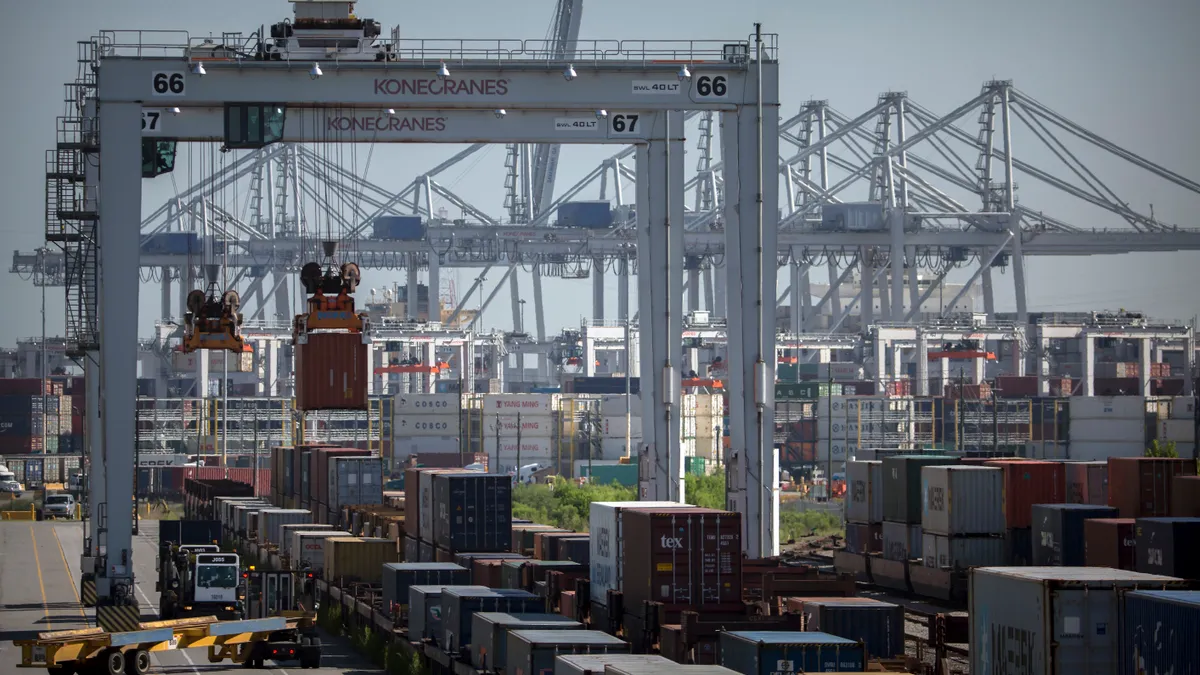UPDATE: March 25, 2020: The Port of Baltimore Seagirt Marine Terminal will close Monday and Tuesday as a result of low volume. The port's other terminals will stick to their normal operating schedule, according to an announcement from the state's Port Administration.
Dive Brief:
- U.S. seaports are changing their operations — from layoffs to new hours — as they experience a drop in volume resulting from COVID-19's impact on Chinese suppliers and try to keep port workers safe from the outbreak.
- The Georgia Port Authority (GPA) is temporarily suspending Saturday truck gate hours, according to a website announcement. The Port of Baltimore has also cut hours throughout March as a result of declining cargo volume, according to WBAL. Two terminals at Port Miami will close temporarily as a result of lower than normal volume.
- Port Houston plans to reopen two terminals Friday after it closed Thursday when a member of the International Longshoremen’s Association tested positive for COVID-19. "We have taken prudent steps to ensure we resume operations responsibly and safely," the port said in a release.
Dive Insight:
GPA did not respond to a request to comment on its decision to end Saturday truck gate hours, but its officials have spoken about a reduction in volume in recent weeks.
"March is going to be a slow month and slower than we budgeted," GPA Executive Director Griff Lynch said earlier this month, according to the Chattanooga Times Free Press. "We are looking at three or four weeks of a trough."
The decision to stop Saturday gate hours is likely related to the reduction in volume, according to ManWo Ng, an associate professor of information technology and decision sciences who has studied port operations at Old Dominion University.
"During normal times, reduced gate hours most likely would have resulted in longer truck turn times and port congestion," Ng wrote in an email to Supply Chain Dive. "But with volumes down so much, this should not be an issue in the current environment. The main inconvenience will probably be the loss of some flexibility: Deliveries and pickup of containers now need to be scheduled over 5 days instead of 6."
So long as the return of containers and equipment is well planned, the reduction should not result in increased detention, demurrage or other charges, he said.
COVID-19 caused quarantines and thus factory shutdowns in China to start 2020, leading to a reduction in export demand.
As a result, ocean carriers blanked a record number of sailings. The Port of Miami Terminal Operating Company at Port Miami will be closed Monday and Tuesday, "due to extremely low import volumes caused by blanked vessel sailings," the terminal said in an operational update
"Looking at the events now unfolding across the entire world, and especially in Europe and North America, our analysis points in the direction that it can no longer be ruled out that container shipping might be looking at developments similar to the financial crisis of 2009," Sea-Intelligence Shipping Analyst Imaad Asad said last week in an emailed press release. "This implies a potential volume loss of 10% equal to 17 Million TEU globally."














